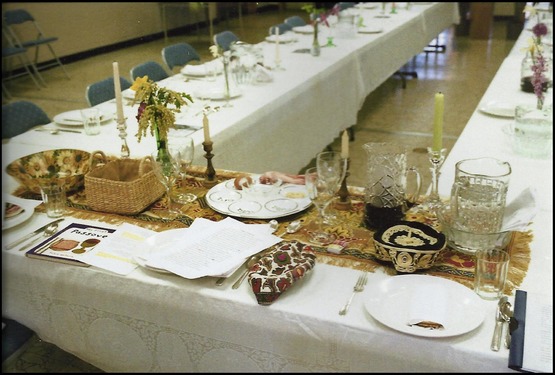 The Jewish Pasch (Passover) is celebrated this year from April 22-30. You may wish to share this information on the Passover as it compares with the Sacrament of Holy Eucharist. The material is taken from The Old Testament: Our Call to Faith and Justice (Ave Maria Press, 2013).
The Jewish Pasch (Passover) is celebrated this year from April 22-30. You may wish to share this information on the Passover as it compares with the Sacrament of Holy Eucharist. The material is taken from The Old Testament: Our Call to Faith and Justice (Ave Maria Press, 2013).
At the center of the Gospel is Christ’s Paschal Mystery. The word paschal is taken from the Jewish word for Passover, pasch. The Exodus, the occasion in which God spared the firstborn children of Israel and allowed Moses to lead his people from slavery in Egypt to the Promised Land, is remembered at Passover. Jesus in the New Testament redefined this experience.
The Gospels suggest that Jesus was celebrating a Passover meal in the upper room with his disciples at the Last Supper (Mt 26:18, Mk 14:22–23, Lk 22:7–13, 1 Cor 11:24–25). At the time that Jesus celebrated this feast, the Passover meal probably included unleavened bread, wine, some herbs, and an unblemished lamb. Their ceremony would have consisted of a blessing (berakah) of both the cup and the bread. These elements are described in the New Testament. Yet, there is no sign of the lamb. In its place, Jesus is the Lamb of God, the unblemished paschal lamb (Ex 12:4–5) who is led to slaughter (Is 53:7). Jesus gave the Passover a new meaning. The Eucharist “fulfills the Jewish Passover” through the Paschal Mystery (CCC, 1340). Christ’s Suffering, Death, Resurrection, and Ascension are a passing over from slavery to sin to ultimate freedom in the Resurrection of humanity.
|
Passover Meal | Eucharist |
Bread and wine (Ex 12:15, Nm 9:11–12) | Jesus shared bread and wine with his disciples (Mt Lk 22:19–20) |
Unblemished Lamb (Ex 12:4–5) | Jesus is the Paschal Lamb, the Lamb of God (Jn 19:36, 1 Cor 5:7, 1 Pt 1:19) |
None of the lamb’s bones should be broken (Nm 9:12) | The soldiers did not break Jesus’ bones on the Cross (Jn 19:33, 36) |
Berekah (“blessing”) | Jesus took the bread and said a blessing (Mt 26:26, Mk 14:22, Lk 22:19–20) |
Celebrates the Hebrews passing from slavery in Egypt to freedom in the Promised Land (Ex 12) | Celebrates the passing from slavery to sin to freedom in the Resurrection, from death to new life (1 Cor 5:7–8) |
Moses poured blood on the people at the establishment of the Covenant (Ex 24:8, Zec 9:11) | Jesus poured out his blood at the establishment of the New Covenant (Jer 31:31, Lk 22:20) |
Guest Speaker
- If possible, arrange for a Jewish person in your neighboring community to speak with the students about the traditions, practice, and meanings of Passover.
Resources
- Catechism of the Catholic Church, 608, 1334, 1340, 1362–1367, 1382
